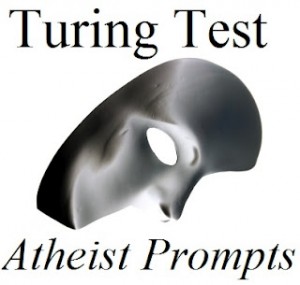This is the seventh entry in the Atheism round of the 2012 Ideological Turing Test for Religion. In this round, the honest answers of atheists are mixed in with Christians’ best efforts to talk like atheists. It’s your job to see if you can spot the difference. The voting link appears at the end of the entry, and you can look at all entries in this round here.
When (if ever) have you deferred to your philosophical or theological system over your intuitions?
I think it would be an inherited system or intuition deferring to a developing system. While in college I renounced my belief in a deity. I was deciding, even though I could not have expressed it then, that I had to build my understanding of the cosmos from the ground up rather than from heaven down.
I still value religious institutions philosophy/theology/morality that is rooted in specific traditions. They must, however, be able to grow and mature in order to earn my respect. Most importantly, they must make room for the possibility that other philosophical (or theological) traditions are closer to the mark than they are.
One particular practice common to most if not all religious traditions that I have come to value, once I finally let myself seriously engage in it, is meditation or prayer, not in the sense of raising concerns or asking for something, but in the sense of becoming empty, focusing, and opening to the cosmos. I am surprise by my attraction to this practice. Is it me listening to and realizing the wisdom of my ancestors in passing this down to me? Or is it my age catching up with me?
Are there people whose opinions on morality you trust more than your own? How do you recognize them? How is trusting them different than trusting someone’s opinion on physics?
There are actually several candidates. Once upon a time I would have said my parents, but then I grew up. There was the college chaplain who talked honestly about his own Christian faith journey, his enjoyment of working with folks from different traditions, sharing with them and learning from them. I was a part of two extended exchange programs early in college, leaving the homogenous United States for a diverse (sometimes parochial & sometimes open) Europe. I remember a couple of folks there who challenged my assumptions directly and indirectly. It was a broadening experience. I would prize input from any of these folks. I seek out their council and that of others. But they are not more qualified to make moral decisions than I am. No one can make such decisions for me. But in the end, such decisions must be mine. I would not entrust such decisions to, nor wish them on anyone else.
It is not a matter of trust but responsibility. We have a responsibility to support and reach out to others, to caution, correct and protect one another. We do not have the right or ability to remove moral responsibility from one another. There may be more in common to teaching/learning moral responsibility and teaching/learning physics than we think. In each case the goal of teaching/learning (which requires trust) is to develop the ability to understand, develop and use principles on your own, whether in the realm of morality or physics.
Can you name any works of art (interpreted pretty broadly: books, music, plays, poetry, mathematical proofs, etc) which really capture the way you see life/fill you with a sense of awe and wonder? You can give a short explanation or just list a few pieces.
A couple of ways that come to mind in which I first experienced awe and wonder, and began to develop my own life philosophy. The first is experiencing nature while growing up on a farm. You didn’t mention agricultural arts in your list, so I will move on to the second; reading.
Huckleberry Finn – Mark Twain: Overhearing Huck Finn wrestle with what he had been taught about slaves, and what he knew about slaves by knowing Jim. Seeing Huck develop the moral courage and resolve to question and challenge everything he knew to be right to help Jim escape.
When the Legends Die – Hal Borland: A story of being ripped from one’s world and the ensuing violent inner struggle to claim identity and place, as well as the healing possibilities of rediscovering “the old ways” and remembering who we were once upon a time.
Foundation Series – Isaac Asimov: For me an exploration of the eternal struggle between insignificance and powerfulness, an investigation of finiteness and the ultimate, even a study of being individuals and yet being wholly connected to all that exists.
These are all things I read when I was young, well before I finished high school these decades ago. They were things that I carried with me when I left home and journeyed into the wide world, and helped me interpret what I saw there. Good stuff.
Click here to judge this entry, and, once you’ve voted, feel free to speculate and trade theories in the comments or look at other entries in this round.
















